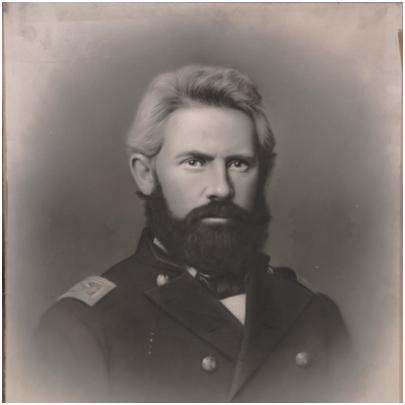
Reign of Terror:
Union General Paine’s Occupation of the Jackson Purchase
Written by Justin D. Lamb

Confederate sympathizers in western Kentucky referred to Union General Eleazer A. Paine as “Ol’ General Pain.” They knew well the proper spelling of his name, but knew even better the pain he inflicted on the Jackson Purchase area during the Civil War. His brief, but horrific rule left a lasting impression that harbored feelings of ill will and resentment for years to come.
Born in 1815, Eleazer A. Paine graduated West Point in 1839 and briefly served in the Seminole Wars. He began his career as a lawyer in Ohio before dabbling in Whig and Republican politics. He became an early supporter and a close friend of Abraham Lincoln which would serve his political and military career well.
When the War Between the States began in 1861, Paine was selected as Colonel of the 9th Illinois Infantry and was mustered out for service in April 1861. By September, Paine was appointed Brigadier General and was given command of the Third Brigade, First Division in the Army of the Mississippi which was sent to Paducah to guard the critical supply depot for the Union Army. McCracken County was the strongest pro-Union county in the overwhelming Confederate Jackson Purchase. Despite orders from General Ulysses S. Grant to “go easy on the citizens of Paducah,” General Paine ignored his superior officer, and after meeting with the Union supporters in Paducah, Paine concluded that they could not be trusted any more than the Rebels.
A day after General Grant left Paducah, General Paine “accidentally” fired a gun from one of the gunboats into the city of Paducah. No one was killed as the shell hit the home of a Paducah citizen. This tactic was done to terrorize and intimidate the citizens of Paducah. Paine later wrote General Grant stating, “He was compelled to be severe for every man is a rank secessionist” and he soon gained a reputation as a harsh and ruthless man as his reign of terror began. When General Paine ordered a local blacksmith to shoe his horse, the smitty refused. General Paine had him arrested and gave him two options: shoe the horse or be shot down. One wealthy rebel sympathizing aristocrat lady displayed a Confederate flag over her large home in opposition to Paine. General Paine’s troops tore down the flag and hoisted up the Federal flag while they played “Yankee Doodle.” The owner of the home was told never to raise a rebel flag again over the home or it would be completely destroyed. These tactics led the Union-leaning citizens of Paducah and McCracken County to quickly sympathize with the Confederate cause out of resentment of the Union army occupation under Paine. It was later said that “Paine did more to bolster Confederate support in Paducah than anyone who swore an oath to the Confederate flag.”
To further rid the city of rebel rousers, General Paine ordered the execution of all suspected Confederate guerillas in the area and soon aimed his terror at the Jewish population in the town. Paine placed the blame of the continued guerilla warfare on the Jews in Paducah. Paine had no proof or evidence to back up his claims, but he convinced General Grant that the wealthy Jewish population in Paducah was aiding and funding the Confederate guerilla warfare in the area. General Grant approved the expulsion and removal of 30 prominent Jewish families of Paducah. They were loaded up without warning and without trial and shipped north to Cincinnati where they were let out.
Paducah became like a ghost town. Stores closed up out of fear and no one walked the streets trying to stay out of Paine and his troops’ wrath. Many packed up and sought shelter in the countryside and neighboring counties. Illegal trade with the Confederacy became rampant in the area out of further spite to General Paine.
Paine was given new orders to secure the railroads of the area and he and his men were sent out to tighten their grip on the countryside of the western Kentucky and Tennessee areas. His headquarters was soon moved to Gallatin, Tennessee because it was a center for all area railroads. Gallatin resident, Alice Williamson, kept a diary during the war and often referred to General Paine in her writing as “Our King”, “His Lordship,” “Thunderstorm,” and “Old Hurricane” and she recorded firsthand accounts of his tyranny. Paine and his men crisscrossed the area terrorizing civilians and executing Rebel spies without trial. His execution methods became a “game” and Williamson recorded in her diary one method called “chasing the fox with fresh horses” where his men on fresh horses would chase down and kill prisoners who were set free on old horses on courtsquare.
On March 25, 1864, Confederate General Nathan B. Forrest led his legendary raid into Paducah which greatly alarmed Union forces. The successful raid gave a morale boost to Confederate supporters in the area, and not long after, three Unionists were murdered by Confederate guerillas in Marshall County on May 9, 1864. Three days later, Confederate guerillas made an attack on nearby Mayfield which was the home of Unionist Republican Congressman Lucian B. Anderson. Frantic that Union gains were being lost in western Kentucky, Congressman Lucian B. Anderson pleaded with President Lincoln to return Paine to Paducah.
On July 9, 1864 at the request of Congressman Anderson and by direct orders of President Lincoln, General Paine returned to Paducah to once again assume command and put an end to the illegal Confederate trade and guerilla warfare tactics. The citizens of the town who remembered his first reign of terror nervously held their breath. Paine essentially took control of all of the Jackson Purchase region and told the residents that he was there to initiate his “plan of salvation” that “will teach you that having encouraged this rebellion, having comforted and aided your country’s enemy, you must, and shall reap a traitor’s reward.” More plundering, harassment, and murder ensued. Some suspected rebel spies were banished to Canada.
When the presidential election was held in early November 1864, suspected Confederate supporters and Democrats were not allowed to vote. Despite not carrying a single county in the Jackson Purchase in the 1860 election, President Lincoln carried every Jackson Purchase county in 1864. When asked how this was possible it was reported that one of the president’s advisors told President Lincoln, “this happened by the bayonet, Mr. President, by the bayonet.”
After receiving complaints of brutality from fellow Union officers, Paine was reassigned to Illinois. After a meeting with President Lincoln, 30-year old Jewish Paducah merchant Caesar Kaskel rushed back to Cincinnati with an order in his hand stating that he and the other displaced Jewish families could return home to Paducah. According to “Outlaws Before the World: The Story of General Orders Number Eleven,” the Jewish group started their journey home, but when they landed at Broadway in Paducah, they were met by the provost marshal and a group of soldiers who tried to stop their return. The marshal demanded to know by whose orders they had returned. “By orders of the President of the United States!” Kaskel replied as he walked back on Paducah soil.
A congressional inquiry into General Paine actions was held in Paducah by Secretary of War Edwin Stanton in February 1865. After an investigation, Secretary Stanton acquitted Paine of any wrong doing. His acquittal enraged the citizens of the Jackson Purchas and antipathy toward the Union army and Republican Party set in for generations. The Democratic Party which sided with the ex-Confederates became a dominant force in Jackson Purchase politics for decades. For years to come, many western Kentuckians who remembered or heard their parents or grandparents talk about Paine’s Reign of Terror would spit on the ground when anyone dare uttered the name of “Ol’ General Pain.”
